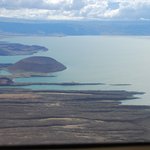EES News

(Feb. 16, 2026)
From Studying Earth to Saving ItEarth and environmental sciences alumni are tackling climate change, sustainability and environmental policy across the globe.

(Jan. 13, 2026)
When Tropical Oceans Were Oxygen OasesResearch reveals when and why ancient tropical seas transitioned from oxygen oases to marine dead zones, providing clues to the long-term evolution of oceanic environments.

(Nov. 10, 2025)
Climate’s Impact on EarthquakesNew research from scientists at Syracuse University and the University of Auckland highlights the connections between climate, tectonics and human evolution.

(Sept. 25, 2025)
How Forests Sparked Deep-Sea LifeAbout 390 million years ago, Earth’s deep oceans filled with oxygen, turning them into homes for diverse marine life. The first forests on land drove this transformation, releasing both oxygen and nutrients to the sea.

(Sept. 23, 2025)
Secrets Beneath Greenland’s IceWhat lies beneath the surface of the Greenland Ice Sheet may hold the key to understanding one of the most pressing climate challenges of our time: sea-level rise.

(Aug. 28, 2025)
Summer Research: Major ImpactStep into the labs where students spent their summer developing research-driven responses to global challenges, blending curiosity with impact.

(Aug. 22, 2025)
Safer Lakes, Cleaner WaterA new lakebed mapping initiative on Skaneateles Lake is helping scientists pinpoint nutrient-rich sediments that fuel harmful algal blooms (HABs), a growing threat to Syracuse’s major drinking water source.

(July 14, 2025)
EES Professor Quoted in New York TimesProfessor Christopher Junium offered insight regarding a 70 million year old fossil found under the parking lot of the Denver Museum of Nature and Science.
